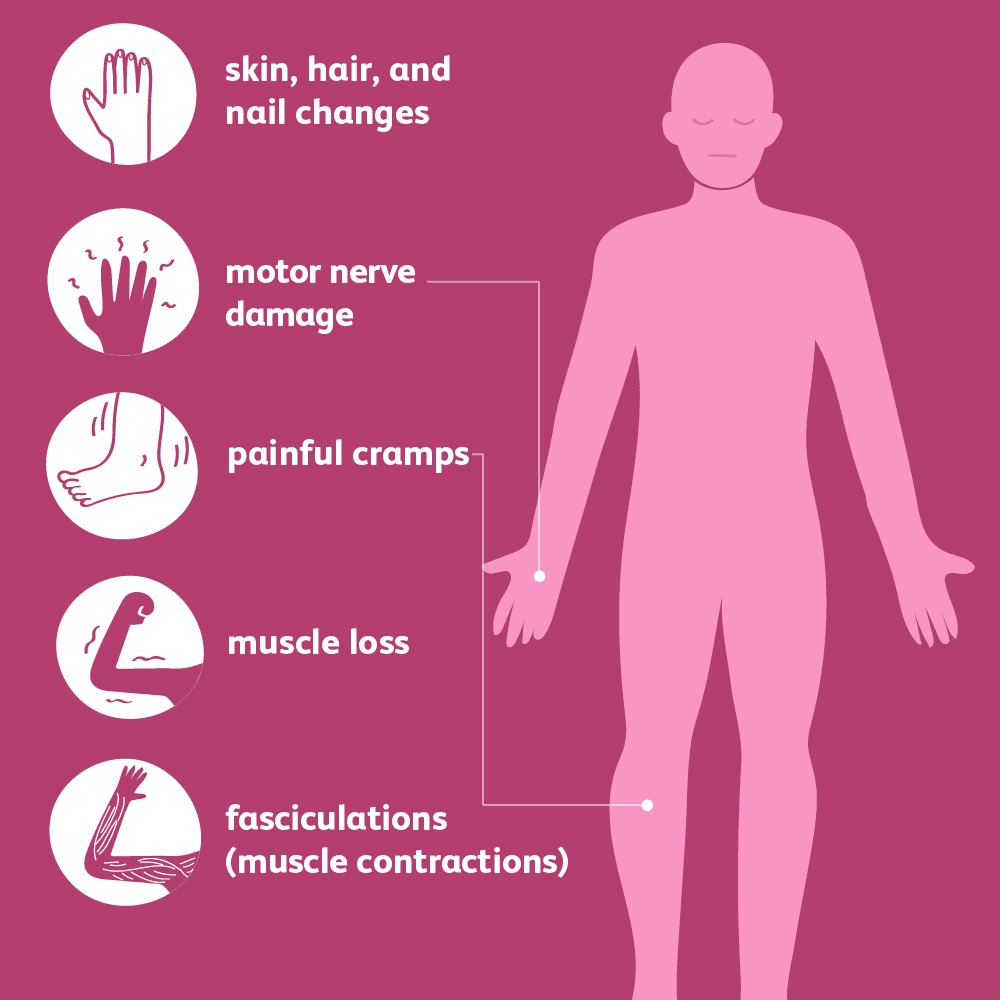
What is Neuropathy?
Neuropathy – also called peripheral neuropathy – refers to any condition that affects the normal activity of the nerves of the peripheral nervous system. Causes can be both inherited and acquired. Diabetes is often a factor.
The peripheral nervous system is made up of 3 types of nerves, each with an important role to play in keeping your body healthy and functioning properly.
- Sensory nerves carry messages from your senses through your spinal cord to your brain. For example, they tell your brain you are touching something hot.
- Motor nerves travel in the opposite direction. They carry messages from the brain to your muscles. They tell your muscles to move you away from the hot surface.
- Autonomic nerves are responsible for controlling body functions that occur outside our control, such as breathing, digestion, heart rate, and blood pressure.
Neuropathy results when nerve cells, or neurons, are damaged or destroyed. This distorts the way the neurons communicate with each other and with the brain. Neuropathy can affect 1 nerve or nerve type, or a combination of nerves.
Neuropathy Causes and Symptoms
Neuropathy Symptoms
Every nerve in your peripheral system has a specific function, so symptoms depend on the type of nerves affected. Nerves are classified into:
- Sensory nerves that receive sensation, such as temperature, pain, vibration or touch, from the skin
- Motor nerves that control muscle movement
- Autonomic nerves that control functions such as blood pressure, heart rate, digestion and bladder
Signs and symptoms of peripheral neuropathy might include:
- Gradual onset of numbness, prickling or tingling in your feet or hands, which can spread upward into your legs and arms
- Sharp, jabbing, throbbing or burning pain
- Extreme sensitivity to touch
- Pain during activities that shouldn’t cause pain, such as pain in your feet when putting weight on them or when they’re under a blanket
- Lack of coordination and falling
- Muscle weakness
- Feeling as if you’re wearing gloves or socks when you’re not
- Paralysis if motor nerves are affected
If autonomic nerves are affected, signs and symptoms might include:
- Heat intolerance
- Excessive sweating or not being able to sweat
- Bowel, bladder or digestive problems
- Changes in blood pressure, causing dizziness or lightheadedness
- Peripheral neuropathy can affect one nerve (mononeuropathy), two or more nerves in different areas (multiple mononeuropathy) or many nerves (polyneuropathy). Carpal tunnel syndrome is an example of mononeuropathy. Most people with peripheral neuropathy have polyneuropathy.
Neuropathy Causes
Not a single disease, peripheral neuropathy is nerve damage caused by a number of conditions. Health conditions that can cause peripheral neuropathy include:
- Autoimmune diseases. These include Sjogren’s syndrome, lupus, rheumatoid arthritis, Guillain-Barre syndrome, chronic inflammatory demyelinating polyneuropathy and vasculitis.
- Diabetes. More than half the people with diabetes develop some type of neuropathy.
- Infections. These include certain viral or bacterial infections, including Lyme disease, shingles, Epstein-Barr virus, hepatitis B and C, leprosy, diphtheria, and HIV.
- Inherited disorders. Disorders such as Charcot-Marie-Tooth disease are hereditary types of neuropathy.
- Tumors. Growths, cancerous (malignant) and noncancerous (benign), can develop on the nerves or press nerves. Also, polyneuropathy can arise as a result of some cancers related to the body’s immune response. These are a form of a degenerative disorder called paraneoplastic syndrome.
- Bone marrow disorders. These include an abnormal protein in the blood (monoclonal gammopathies), a form of bone cancer (myeloma), lymphoma and the rare disease amyloidosis.
- Other diseases. These include kidney disease, liver disease, connective tissue disorders and an underactive thyroid (hypothyroidism).
Neuropathy massage treatment
Some studies have found neuropathy massage treatment may be helpful for:
- Alleviate low-back pain and improve range of motion.
- Lessen depression and anxiety
- Enhance immunity by stimulating lymph flow—the body’s natural defense system
- Sports injuries
- Improve the condition of the body’s largest organ—the skin
- Increase joint flexibility
- Pump oxygen and nutrients into tissues and vital organs, improving circulation
- Paresthesia and nerve pain
- Reduce spasms and cramping
- Release endorphins—amino acids that work as the body’s natural painkiller
- Arthritis
- Relieve migraine pain
Studies of the benefits of massage demonstrate that it is an effective treatment for:
- Decreased anxiety
- Enhanced sleep quality
- Greater energy
- Improved concentration
- Increased circulation
- Reduced fatigue
Contact Our Mobile Massage Clinic | The Villages, Florida

In Home or In Office Massages by Jacqueline in the Central Florida area. Certified for many different massages and treatments. Specializing in Manual lymphatic drainage (MLD) post surgery recovery massage.
To schedule an appointment with Licensed Massage Therapist and Certified Advanced Manual Lymphatic Drainage Therapist, Jacqueline Bosco CMLDT, Oncology, please call (813) 298-5603. We believe nothing is more important than human touch.
Providing massage services to patients in The Villages, Florida, Sumter County, Leesburg, Eustis, Mount Dora, Tavares, Lady Lake, Fruitland Park, Wildwood, Bushnell and surrounding areas.
